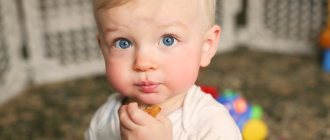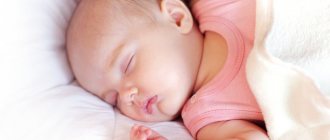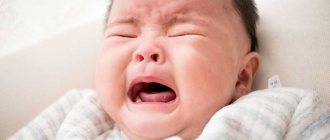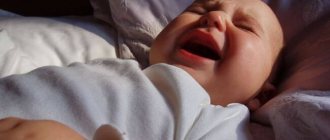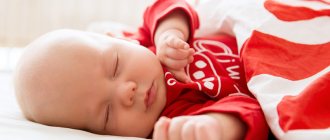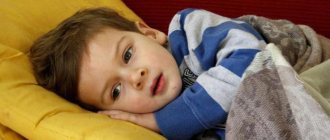Urinary standards
Pediatricians have determined the norms of urination in children. They depend on their age and physical development. If the child is fully formed, is not sick, follows the correct daily routine, and eats well, then everything will be fine with the volume of deurination. One thing to keep in mind is that teenagers and adults pee less often than newborns.
Generally accepted indicators of frequency and volume of deurination:
- from birth to six months, the normal frequency of urination is at least 15 times, maximum 25 times during the day (the amount of one bowel movement varies from 20 to 40 milliliters of urine);
- from 6 to 12 months, babies pee 14-16 times a day, 30-45 ml;
- when a child is one year old and up to 3 years old, he should pee up to 10-12 times a day (urine norm is 50-80 ml);
- from the age of three to five years, the child “walks small” only 6-8 times a day, the volume of urine ranges from 60 to 90 milliliters per urination;
- children from 5 to 7 years old defecate 5-8 times in 24 hours (100-150 ml of urine is released per deurination);
- from 7 years to 9 years of age, the child pees 7-8 times a day, the volume of one urine output is 140-180 milliliters;
- when people are 9-11 years old, people visit the toilet little - from 6 to 7 times per 24 hours (urine level varies from 230 to 250 ml);
- at 11-13 years of age it is considered normal to pee 6-7 times a day with the amount of one emptying being 250-270 ml.
If you start to notice that your child is visiting the toilet 2-3 times an hour, this may indicate serious health problems.
How much water should you drink?
Before you “run” to the doctor with the problem of excessive fluid consumption by a child, you should establish a simple fact: the norm of water consumption at his age. Often people who drink little ordinary water compare the norms by themselves. They believe that a glass or two a day is quite enough, and anything more is a violation. However, the body's individual need for water depends on body weight and environmental conditions. For example, a man weighing 100 kg needs more water per day than a miniature woman weighing 55 kg.
For children, there are average daily water consumption standards depending on age:
- 234 234
More details - 234 234
More details
- 330 330
More details
- 315 234
More details
- Up to 3 years - 700-800 ml;
- From 7 to 12 years - 1000-1700 ml;
- From 12 years - from 1700 ml.
In addition, it is worth considering that a teenager’s body is growing, and for harmonious development it requires energy, oxygen and nutrients. All this is delivered to cells and tissues through water. Therefore, aquatic children should not cause concern to their parents.
Causes of frequent urination
The main reasons why young children empty their bladder more often than normal: hypothermia; taking diuretic medications, herbs; a number of psychological reasons (stress, nerves, anxiety, depression, neurological disorders); serious diseases and pathological abnormal changes of the bladder and urinary canals.
Parents should worry if their baby “walks small” more often than usual for 3-5 days. In this case, you need to monitor the smell of urine, its color and shade. If your baby is in pain when going to the toilet, or complains of burning and itching after urinating, you should immediately seek medical help.
To find out the root cause of frequent bowel movements, it is recommended to undergo a series of tests to obtain a complete clinical picture. The cause of the inflammatory process of internal organs may be non-compliance with hygiene rules.
If you don’t change a baby’s diapers for a long time, his genitals become rotten and the inflammatory process begins to activate. Special attention should be paid to the hygiene rules of girls. If you take improper or insufficient care of your body, bacteria from the rectum can spread to the genitals, which will lead to inflammation of the pelvic organs.
Diseases that cause frequent urination
One of the diseases that affects young patients is genitourinary tract infections. In this case, the following is observed: a small volume of urine, frequent false urge to empty, pain and stinging during the passage of urine.
If there are symptoms of infectious diseases that are accompanied by fever, incontinence, pain in the lower abdomen and perineal area, a change in the color of urine, this indicates cystitis, which is in the acute stage. An elevated temperature indicates that the body is fighting an inflammatory process. In this case, it is necessary to undergo a course of treatment with medications, which should only be prescribed by a doctor.
Symptoms of diabetes: the child drinks a large amount of water and constantly asks to go to the toilet, loss of appetite or changes in food preferences. Signs of diabetes mellitus also include weight loss, lethargy and drowsiness. An endocrinologist can help cure the disease.
Overactive bladder is a pathology that occurs in young patients aged 5-6 years. If after this age the frequency of bowel movements does not return to normal, you should consult a pediatrician or neuropsychiatrist.
Signs of enuresis include urination that cannot be controlled. Frequent urination may hide synechia in females, hypoplasia, and other pathological changes.
“Drinks and urinates more often” – alarming symptoms of diabetes in a child
Author:
gastroenterologist Anton Smirnov
1 minute
6125
In the UK, doctors urge parents to follow the “four T rule” - to pay attention to symptoms that may indicate the onset of type 1 diabetes in a child:
- Toilet: increased frequency of urination, including renewed bedwetting in children, increased volume of urine in diapers in infants.
- Thirsty (thirst): the child constantly wants to drink, including at night, and increasing the volume of fluid consumed does not quench thirst. You need to be especially careful if your child has developed the habit of keeping a container of water next to the bed, so as not to run to the kitchen every time.
- Tired (fatigue): fatigue, weakness, drowsiness without objective reasons.
- Thinner (weight loss): the child began to lose a lot of weight without dieting or increased physical activity.
Even if only one sign is detected, this is a reason to immediately contact a pediatrician and take a blood test for fasting sugar.
Pediatrician Sergei Butriy in his blog draws attention to the fact that parents often do not attach importance to these symptoms, or even rejoice at them. Sleeping more than usual? Well, good, sleep is the best medicine. Have you lost weight? Great, otherwise my tummy is full. Moreover, even doctors often write off the symptoms described above as something harmless, or make an incorrect diagnosis. Ketoacidosis often mimics viral gastroenteritis, including vomiting and acute abdomen, which leads to emergency hospitalization in the infectious diseases department, and sometimes to erroneous surgery. Lost time and incorrect diagnosis can lead to ketoacidosis coma and even death from acute cerebral edema.
“If insulin administration is not started on time, there is a considerable chance of complications and even death of the child,” the doctor writes.
The problem of timely detection of diabetes mellitus in children is acute in all countries, so doctors pay great attention to educational work. In the Italian province of Parma, doctors distributed posters in schools, kindergartens and pharmacies for eight years that read: “Is your child drinking and urinating more than usual? Is his bed wet again? Check his sugar level! Thousands of postcards were also printed and handed out on the streets, in supermarkets and even at football matches. The results were impressive: 81% of children with diabetes did not have severe ketoacidosis, compared with 27% of children in other regions where the campaign was not carried out.
Solution
According to statistics, urinary problems in childhood are observed in 1 out of 5 families.
If these problems are not related to the baby’s health, then you should look for reasons for frequent urination in something else:
- first, parents should pay attention to the process of the little one going to the potty (there are cases when children want to please their parents and constantly go to the potty, because the adults, when they taught the baby to use it, were very happy with the success of their child);
- second, stressful situations negatively affect the child’s well-being; it is because of psychological stress in the family that children pee in the bed at night;
- third, children should not be allowed to drink 2-3 glasses of liquid before bed.
Causes of thirst
The reasons for a child’s consumption of large volumes of water can be physiological or pathological, that is, associated with some kind of disease.
Physiological causes of night thirst
- Associated with the nature of nutrition, with the consumption of certain foods. It can be:
- meat dishes;
- cereal dishes;
- hard cheeses of different varieties;
- salted and pickled vegetables.
Consumption of these products causes increased thirst and requires water to improve digestion. You should not feed your baby abundantly before going to bed. The child will drink more due to overeating or if he eats dry food. Infants drink a lot when complementary foods are introduced into their diet.
It is also not recommended to feed your child before bedtime foods that promote increased formation of gases in the intestines. Bloating will cause discomfort that will prevent your baby from sleeping peacefully. The child does not understand the reasons for the anxiety and asks for a drink.
- Climatic conditions. On hot days in summer, high temperatures and dry air can lead to excess fluid loss from the body, especially in young children.
Even in the cold season of the year, if the conditions for a comfortable microclimate are not created in the apartment (humidity above 50% and air temperature 18-22 0C), then the need for water will increase.
The child will and should drink more fluids in such conditions. Wet daily cleaning of the room, air humidification, ventilation, and air conditioning will prevent overheating of the child's body.
- Clothes that do not correspond to the weather conditions or microclimate in the apartment. Too warm, tight-fitting clothes, especially those made of synthetic fabric, contribute to disruption of thermoregulation, which increases thirst.
- The baby's desire to satisfy the sucking reflex can also be the reason for consuming significant amounts of liquid at night. This can be observed in babies whose mother has stopped breastfeeding, which is why they require drinking from a bottle with a nipple several times during the night.
- The baby does not have enough parental attention, and he asks for a drink, turning it on himself (according to psychologists).
- The child has developed a habit: if he quenches his thirst during the day with juice, compote, or sweetened tea, then at night he will demand exactly that. The developed habit not only prevents the baby and parents from resting, but can also negatively affect the condition of tooth enamel and cause a malfunction of the endocrine glands.
Determining whether a child is really thirsty, or whether it is a desire for sweet compote or tea, is very simple: offer him to drink only water. If the baby becomes capricious and refuses water, it means there is no thirst and the mother has nothing to worry about.
Some children, waking up at night, demand to drink, as they are used to falling asleep only after eating or drinking. Older children, not wanting to fall asleep after waking up, can invent activities (“I want to drink”, “I want to go to the toilet”, “I want to eat”, etc.). To avoid such awakenings at night, experts do not advise feeding your child foods that can cause thirst during dinner.
Pathological causes of thirst
Dry mouth and increased fluid intake may be associated with the child’s painful condition:
- An increase in body temperature during an infectious or cold disease or teething contributes to the appearance of strong thirst and, accordingly, an increase in the volume of fluid drunk. Drinking plenty of water helps lower the temperature.
- Vomiting and diarrhea can lead to dehydration, one of the symptoms of which will be severe thirst.
But these diseases are acute, that is, drinking large quantities of liquid will be a transient, temporary phenomenon.
If a child constantly drinks a lot at night, then a consultation with a pediatrician is necessary to rule out diseases such as diabetes insipidus or diabetes mellitus, pathology of the brain, thyroid gland, kidneys and liver. Most likely, in these cases the child will drink a lot of liquid not only at night, but also during the day.
To make it easier for the doctor to make a diagnosis, parents need to pay attention to the presence of the following symptoms in the child:
- rise in body temperature in the morning and evening;
- headache;
- changed color of urine;
- the amount of liquid drunk does not correspond to the volume of urine excreted per day;
- pain in the abdomen, lower back and other parts of the body;
- decreased or increased appetite;
- a sharp increase or decrease in body weight;
- increased fatigue;
- the presence of edema and its localization;
- constant dry mouth;
- increased nervousness.
If your child exhibits any of the listed symptoms, you should not delay a visit to the pediatrician. After the examination, the doctor may prescribe, if necessary, an examination (blood and urine tests, determination of blood sugar, blood tests for hormones, ultrasound), and a consultation with an endocrinologist.
Why does my child drink a lot at night and sleep poorly?
From birth, the baby sleeps a lot, most of the day, waking up for feedings. Breastfeeding will fully satisfy the baby's need for water, milk 87-88% of breast milk consists of water, and the remaining 12-13% constitute that most valuable base of vitamins, minerals, nutrients and essential immunoglobulins that the baby so needs.
Every month the child sleeps less and is awake more. Normally, the time spent awake during the day increases, while sleep at night remains long, about 11 hours - starting from six months.
At this age, healthy children can withstand 5 hour intervals per night without feeding. But it happens that a child of 6-8-9 months and even older - by the age of one year, 1.5-2 years - wakes up at night in order to drink water or milk. Most often, night awakenings due to feedings or thirst completely go away by the age of 3.
If the baby is breastfed, then in this case it is difficult to differentiate his needs, because breastfeeding will satisfy many basic needs: food, water, but the main one is the need for closeness with the mother.
If a child older than 6 months wakes up frequently at night, is restless, sleeps poorly and can fall asleep again between cycles only after latching on to the breast, we can say that he has formed a negative association with sleep - breast (feeding). By the word “negative” we mean a constant association, without which falling asleep for a child turns out to be very difficult; this is the stimulus without which he cannot fall asleep.
Formula-fed children may also have trouble sleeping and waking up at night to drink. In this case, we are also talking about a negative habit that prevents the child from sleeping peacefully.
Habit or need for water?
How can you figure out where the habit is that interferes with sleep, and where the child’s natural need for water is?
So, what do you need to pay attention to if your baby sleeps restlessly and drinks a lot at night?
- First of all, you need to make sure that the child is healthy. Some diseases, such as diabetes, can provoke a greater need for water. Therefore, if you notice that your child drinks a lot often, it makes sense to consult your doctor about this topic.
- Check the sleeping conditions in the room. Make sure that the humidity in the sleeping room is at least 40% (optimal humidity is 40-60%), the room is not hot or stuffy, and it is sufficiently ventilated.
- Sleepwear and bedding should also be made from natural, breathable fabrics that do not provoke increased sweating and, as a result, thirst.
- Baby's diet. If it so happened that at night the baby tried something unusual, salty, for example, he may have an increased need for fluid.
If you haven’t found in this list of reasons that suit your situation, most likely it’s not a natural need for water, but just the need for your mother’s help - in contact with her and directly in the stimulus that is associated with sleep - be it breast or bottle with water or formula.
How can I help you get rid of a “negative” habit?
What can you do to help your baby overcome “negative” sleep habits and help him sleep more peacefully?
- First of all, think about how you can help your child fall asleep in another way. Many mothers get scared and say: “This is impossible! He can only sleep when he drinks.” Here it is worth remembering those mothers who, for one reason or another, do not breastfeed their child, but at the same time they have no idea that the child cannot sleep without a breast. It is important to understand what is behind the baby's need for breastfeeding. As a rule, this is precisely the need for mother, for closeness with her. And any mother knows many ways to satisfy this need not only through feeding.
The need for breasts is not only hunger. As a rule, this is precisely the need for mother, for closeness with her.
- Discuss with your spouse the possibility of his participation in putting the child to bed at night. Often, it is dad’s help that turns out to be that important step that demonstrates to the whole family that the habit that the baby has formed for falling asleep is not insurmountable, and he can fall asleep perfectly without the breast.
- Transferring the ritual. When we talk about separating the breast-sleep association, we do not mean refusing to feed. Here we are only talking about postponing the feeding ritual to an earlier time so that the very moment of falling asleep is not associated by the baby with the breast. To do this, the mother can feed the baby, for example, immediately after a bath, and then help him by rocking him and singing lullabies. These rituals can also be performed by the baby's father, taking him immediately after feeding and putting him down without the help of his mother.
- Structuring chaotic night feedings. If the child wakes up several times during the night, and the mother needs to feed him every time so that he falls asleep, you can introduce a certain feeding regimen, for example, three feedings at night (if the baby is about 6-8 months old), or 2 if he is older, 9- 10, closer to a year. During these awakenings, you can feed, for example, with a small night light, in a chair, so that the baby gets used to feeding under certain conditions and at a certain time. On other occasions when the baby wakes up, you can calm him down in a different way - rock him, stroke him, walk with him.
- Independent drinking. If an older baby already knows how to drink from a sippy cup on his own, at night you can put a sippy cup with water in a place that he knows about, so that the baby can drink as independently as possible. As a rule, when a baby wakes up to drink, he actually wants to communicate with his mother at night, and if he drinks on his own, these awakenings will soon become unnecessary.
Frequent Waking Up Eating Sleeping Breastfeeding Sleeping By Age
AssociationsNaSleep

